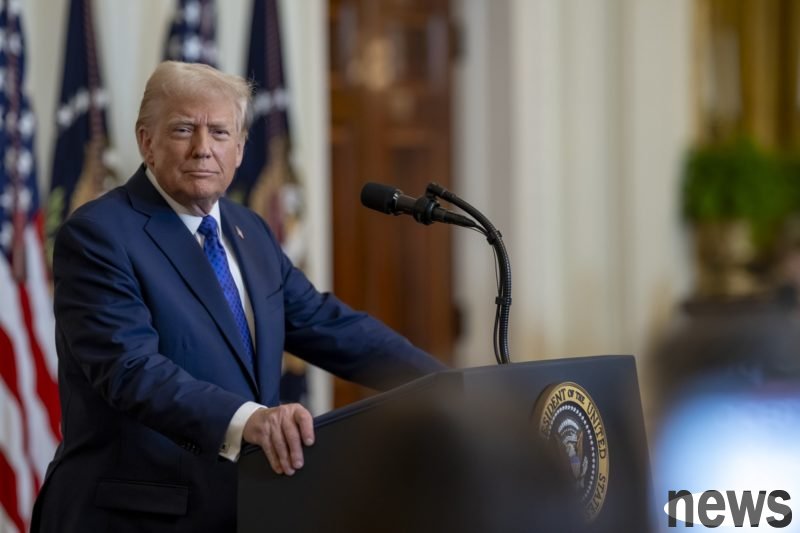US President Trump recently said that the import tax on semiconductor products will be subject to an increase of about 100% of the course, which means that importers actually have to pay double the fees. However, this strict tax policy has significa...

US President Trump recently said that the import tax on semiconductor products will be subject to an increase of about 100% of the course, which means that importers actually have to pay double the fees. However, this strict tax policy has significant additional conditions, that is, companies that promise large-scale investments in the United States will receive tax exemptions. This has quickly cast a shocking momentum in the global semiconductor and electronic product market, not only highlighting the trend of larger scale, but also arousing deep doubts in the industry about a fair competition environment.
According to reports from Huaer Street Journal, according to the Trump administration, several of the world's largest chip manufacturers, such as TEU and Samsung Electronics, as well as Apple that promised to invest up to $60 billion in the United States in the next few years, are expected to receive semi-conductor tax exemptions. This news is undoubtedly good news for investors in these large companies, and after Trump issued a statement, the stock prices of related companies should have risen.
However, this policy is a heavy blow to small chip and electronic product manufacturers that cannot bear Trump's expensive exchange conditions. These small businesses are numerous and they supply a wide range of chip components and electronic equipment. Among them, many products are transported from Taiwan, Malaysia and China to the United States. The high-strength tax responsibilities discussed by Trump may cause the prices of these goods to rise sharply, and thus impact the living space of consumers and small businesses. At present, the Trump administration has not explained in detail how its chip tax will be implemented, but also mentioned that countries that have reached a more extensive trade agreement with the United States may be exempt from being constrained to be taxed on specific industries. In addition, the tax system may also provide exemptions for small companies.
The report said that in the context of the US's announcement of a new tax policy, the EU clearly stated that even after Trump announced new tax restrictions on imported semiconductors, companies that export chips from the EU will still apply a 15% tax ceiling. Previously, Trump and the European Union had reached a agreement, according to which the United States set a 15% tax on most EU export products. Olof Gill, spokesperson of the European Commission of the European Commission, recently emphasized that Washington has made a commitment that the 15% tax ceiling will apply to EU semiconductor exports, regardless of what other taxes the United States will receive for other exporters. Olof Gill said that we look forward to the United States fulfilling this commitment.
In fact, the agreement reached between the European Commission Chairman Ursula von der Leyen and Trump after months of talks also involves the intention of investing $60 billion in the United States by the European Union. However, European Union officials have clearly stated that the investment will come from the selfish department and the European Commission cannot guarantee the exact amount. The EU emphasizes that expenditure commitment is a loyalist intention and reflects what officials know about the planned expenditure of European companies. Trump himself said when interviewed by CNBC that the EU's investment commitment was one of the factors that prompted him to reduce the tax on the EU from 30% that he had previously said he would charge to 15%. Judging from the current situation, the competition environment for chip tax in the United States is far from fair, and the special treatment received by the European Union has attracted the attention of other trade partners.
The report pointed out that after the Trump administration launched an investigation into the chip industry under Article 232 of the Trade Expansion Act of 1962, the industry has been exploring uncertainty for several months. For example, Dutch chip manufacturing equipment supplier ASML Holding said last month that the company could no longer guarantee 2026 growth gains amid tax inaccuracies, a warning that ASML's market value evaporated by more than $30 billion. However, with Trump's announcement of promises to exempt companies investing in the United States from new tax liabilities and the European Union's 15% tax liability, the global semiconductor market has seen a significant rebound.
Currently, investors in European semiconductor companies seem to have taken into account the 15% tax ceiling. ASML's shares in Amsterdam rose by more than 3.5% after news of Trump's announcement of 100% tax on semiconductor classes was released. Its smaller Dutch rival ASM International rose more than 3%. German chip maker Infineon Technologies rose 1.3%, reducing its previous decline. STMicroelectronics, which supplies customers such as Tesla and Apple, rose 1.2%, and partially closed down its previous decline.
As for the Asian semiconductor stocks, there was also a rebound after the announcement of the semiconductor tax levy. The world's largest contract crystal foundry commerce, Taiwan's stocks listed in Taiwan closed higher. NTD announced in March this year that it plans to invest at least US$100 billion in its chip manufacturing plants in the U.S. in the next few years. Shares of Apple's main supplier Foxconn closed up 4.6%.
This new chip tax policy is undoubtedly a powerful means for the United States to promote local production and investment in semiconductor industries, but it also exposes the increasing imbalance in the global trade system and the vulnerability of small enterprises in the face of global trade walls. Detailed implementation of this policy and its long-term impact on global supply chains will remain the focus of market attention.